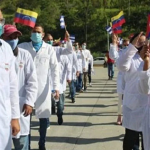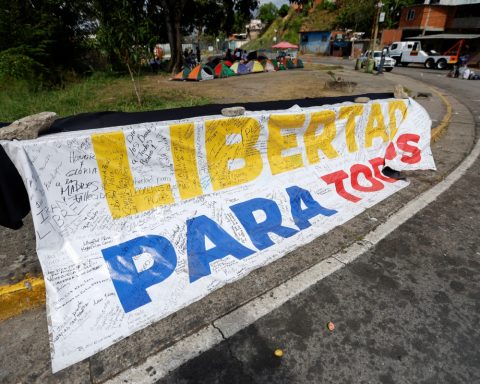It is a fact of the cause that some foreign citizens have been involved in crimes of high social connotation with certain degrees of public alarm. In fact, the increase in homicide rates in the northern regions, especially in Iquique and Tarapacá (from 18 completed homicides in 2020 to 51 in 2021, according to the regional prosecutor’s office itself), is an incontrovertible fact even for the pro-immigrant organizations, whose members ask to make the fair distinction between those people who come in search of a better life and the criminals who take advantage of these flows to commit crimes, of which they are, by the way, their main victims.
According to a study by the CEP “Immigration in Chile: a multidimensional view”, foreigners are only 2.36% of those charged and only 2.57% of those convicted. But this data suffers from a problem: this percentage refers to a rough number of crimes, but does not specify how many of these correspond to crimes of high social connotation such as homicide, contract killings, drug trafficking, kidnapping, human trafficking, etc.
According to various researchers and study centers, disaggregating these gross figures would help to put in its proper dimension one of the most problematic edges of the migratory phenomenon, such as its possible link with the increase in criminal activity. The data must arise from a specific question: what percentage of all crimes of high social connotation committed in Chile involve foreigners, regardless of their immigration status? A simple fact… at least in appearance.
Although the different institutions that are part of the administration of Justice, such as the police and the Judiciary, residually manage the information, it is the Public Ministry, through its Studies Unit, the institution in charge of systematizing the information that comes from the criminal prosecution.
Once the consultation was carried out, the Prosecutor’s Office excused itself from handing over the information because it was not disaggregated, despite the fact that both the problem of security and that of irregular migration afflict society as a whole and, in particular, constitute basic data for governments in order to define the public politics
But the Public Ministry goes further. Sources from the Prosecutor’s Office argued that the information was not statistically systematized in order “not to encourage the stigmatization of the foreign population residing in the country.” In other words, the Prosecutor’s Office decided to dispense with information that, according to the experts, may well help it carry out its persecutory work in a better way, in the same way that it would contribute to a better design of security policies. In other words, the institution subtracts from knowing the data to avoid interpretations. Something similar to prior censorship.
But the data exists, Carabineros reports that any arrest of a person of foreign nationality is duly reported to the Prosecutor’s Office.
the phantom cipher
In the Judiciary, meanwhile, they excused themselves stating that they do not have that information but that they could reach it if they carry out a case-by-case review, a procedure that seems arduous and slow. In the same way, the PDI, whose duties include immigration control, excused himself since the information would not be public. The Undersecretary for Crime Prevention did not respond to the request and private organizations such as Paz Ciudadana did not respond either.
The director of Transparent Chile, María Jaraquemada, observed that the lack of relevant information points to a phenomenon that had already been highlighted at the time by the former Minister of Finance of the government of Sebastián Piñera, Ignacio Briones: the “poverty of data” in State agencies, which prevented him from designing – as he explained in his minute – a focused aid plan during the pandemic. “It’s a data problem, I think. We ourselves, as Transparent Chile, have requested relevant information on corruption and we have not found it. We are talking about relevant and public interest information that is definitely not systematized,” she pointed out.
“And it is information that should be available for research work, to demystify campaigns, for academic work, in short. I believe that it is a pending issue for State agencies to have better data”, added the director of Transparent Chile.
Alejandra Mohor, from the Center for Citizen Security Studies at the University of Chile, believes that there are other factors that explain this inability to access information. “A first thing is that each one of the institutions produces data that is relevant for themselves and for the performance of their work, and these data are produced, stored and organized based on that. They are not designed based on a State perspective, ”says the researcher, who has encountered similar problems in her work, especially in terms of police corruption.
“Another factor is the zeal with which they handle information. There are no incentives to generate information beyond particular tasks. They are watertight entities, and the demands made on them are submitted to the extent possible,” adds Mohor, in order that the Transparency Law has forums that make it possible to refuse to provide information that does not necessarily imply a security risk. of the nation, which is one of the reasons established by law to deny delivery. In the long run, Mohor recalls, institutions can be excused from sharing data if they simply argue that such an obligation implies allocating additional resources to collect the required information. In other words, the institutions always find a way to block the delivery of data, a situation that reveals the gaps in Law 20,285.
“Information is a control mechanism over institutions in a negative sense, in circumstances that could be in a positive sense,” the CESC researcher reminds us. “If there are no management indicators monitored by the State, then it is not a matter that interests me and therefore I do not put efforts there”, she added, highlighting the series of disincentives to comply with a broader accountability. “Ultimately, it’s ‘I don’t want them to watch me so they don’t evaluate me, because if they evaluate me and I did something wrong, it harms me as an institution.’ It is still a state that thinks about protecting itself and is not thinking about the well-being of its citizens,” she stressed. Without going any further, Mohor recalls that it is not yet possible to coordinate the databases of the two police forces.
But it is known that opacity and secrecy are an inexhaustible source of suspicion, including conspiracy theories. And in that sense, the experts agree that there is a real possibility that the “ghost figure” is actually available in the Prosecutor’s Office and that it is kept under lock and key due to the political complexities that its publication could cause, as well as a contribution to the growing xenophobic sentiment that has already taken root in part of the citizenry. “There should be no reason to deny it,” said the director of Chile Transparent, María Jaraquemada. Such information should be provided anyway and “it will be up to the discretion, judgment and responsibility of the media outlet to determine how it presents that information,” she added.
But an uncomfortable truth, if any, does not go away because it is eventually hidden from you. For the academic and criminal lawyer Mauricio Salinas, from the Citizenship and Justice Foundation, this opacity will only increase the suspicions created by the migratory disarray evidenced during the government of Sebastián Piñera, a phenomenon that, according to what he stated, was “most suspicious”.
“I believe that the Piñera government, seeing itself overwhelmed and incapable of legitimizing the existing order, spent the last two years of its government preparing and installing time-delayed bombs that could bring political returns to its sector, and in that arsenal the issue of illegal massive immigration occupies a place of privilege”, he pointed out. “Today we have a very complex situation with many people upset by the inability to manage a flow that causes fewer problems in the local population. We also have thousands and thousands of people in an administrative and legal limbo that, as we all know, generates the necessary conditions to exploit them. And it is obvious that there are people gaining a lot from it,” he added.


















